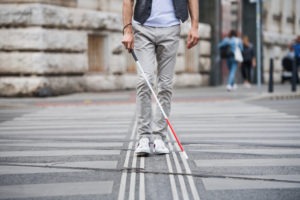
Disability Benefits for Blind Individuals
If you are blind or have very low vision, you may qualify for Social Security Disability (SSD) benefits. The Social Security Administration’s (SSA) rules for blind persons applying for disability are slightly different and more flexible than those for non-blind persons.
If you need more information about disability benefits for blind individuals, speak to the disability lawyers at Berger and Green in Pittsburgh. We can help you learn more about the requirements for benefits and offer assistance with the application process. Call 412-661-1400 for a free consultation.
40+ years of experience from strong, knowledgeable, compassionate attorneys.
Start A Free EvaluationHow does the SSA define blindness?
The SSA maintains a list of impairments in its Blue Book that qualify someone as disabled. The SSA lists most vision-related disabilities in Section 2.00 Special Senses And Speech, including loss of central visual acuity, contraction of the visual fields in the better eye, and loss of visual efficiency.
The SSA defines statutory blindness in sections 216(i)(1) and 1614(a)(2) of the Social Security Act. The SSA will consider you blind if:
- Your vision is, at best, not more than 20/200 in your better eye; or
- Your visual field is 20 degrees or less in your better eye.
We know you’re hurting. We can help. Free case evaluations, home and hospital visits.
Contact Us Now For HelpCan I qualify for disability if my blindness does not meet that description?
You may still qualify for disability benefits even when your blindness does not meet the SSA’s definition if your vision problems prevent you from working, or if you have a combination of impairments that prevent you from working.
The SSA evaluates each applicant on a case-by-case basis. The claims examiner assigned to your case will review your medical history, consider your limitations and capacities, and decide whether you are still capable of working. If they decide that, in light of your vision problems and other medical issues, age, education, and work skills, you cannot work at your old job and cannot adjust to new work, the SSA may still grant you benefits based on a medical vocational allowance.
If you need help understanding the SSA’s qualifications for disability, contact us today. Our lawyers know what the SSA is looking for when it reviews claims and we can guide you throughout the process.
You need an attorney with the experience and dedication to give your case the care it deserves.
Start A Free EvaluationCan I qualify for disability if I am still working?
The SSA offers work incentives that enable blind and other disabled people to simultaneously work and receive disability benefits. The SSA allows blind persons to earn more each month than non-blind persons and still qualify for disability benefits.
In 2017, if you are blind, you can earn up to $1,950 per month and still receive disability benefits. The earning limit for non-blind persons is only $1,170. When applicants earn more than these figures, the SSA will consider them able to engage in substantial gainful activity (SGA) and will disqualify them for benefits.
We can address all the legal hurdles that may be keeping you from getting a fair settlement.
Speak To An Attorney TodayWhat types of disability benefits might I qualify for?
There are two types of disability benefits you may qualify for if you are blind, each with different criteria.
- Social Security Disability Insurance (SSDI):SSDI is a benefit for disabled workers who have earned enough work credits throughout their career. You earn work credits by working at a job where you paid Social Security taxes. If have not worked long enough to accumulate enough credits, the SSA will allow any credits you have earned after becoming blind to qualify you for SSDI..
- Supplemental Security Income (SSI):If you have limited income and resources available to you, then you may qualify for SSI. SSI is a needs-based benefit for disabled people with very limited assets and income.
What are blind work expenses (BWE)?
The SSA has several special rules that help blind persons qualify for disability benefits. If you are applying for SSI based on blindness, the SSA will exclude income used for certain work expenses. These are blind work expenses (BWE). Examples of BWE include:
- Service animal expenses;
- Work transportation;
- Attendant care services;
- Visual and sensory aids;
- Translation of materials into Braille;
- Federal, state, and local income taxes;
- Social Security taxes; and
- Fees for professional associations and union dues.
The criteria for disability benefits are complex—even more so for visually impaired people. Our lawyers can offer advice on how you can qualify for benefits. We can also explain the disability benefits and special services available to the vision-impaired and let you know about any special rules that may benefit you.
How do I prove my blindness to the SSA?
To qualify for disability based on blindness, you will need to provide the SSA with the contact information of any medical professionals who are familiar with your condition. They will need to show the SSA that your central visual acuity in your better eye or your visual field in your better eye meets the aforementioned criteria. Note, when applying based on statutory blindness, you do not need to show the cause of your blindness, nor do you have to meet the standard 12-month duration requirement to qualify.
The SSA will work with your doctor to review evidence of your blindness, which may include:
- A report of an eye examination that includes measurements of your best-corrected central visual acuity or the extent of your visual fields;
- A standard eye examination that shows the cause of your vision loss if you suffer from visual acuity or visual field loss; and
- A description of how your condition affects your daily functional abilities.
Talk to a disability lawyer in Pennsylvania today.
The disability attorneys at Berger and Green offer free, no-obligation consultations for people living with blindness in Pennsylvania. For over four decades we have been helping people collect the disability benefits they need. Contact our office to learn how we may be of service to you, too. Call 412-661-1400 to schedule a consultation today.








